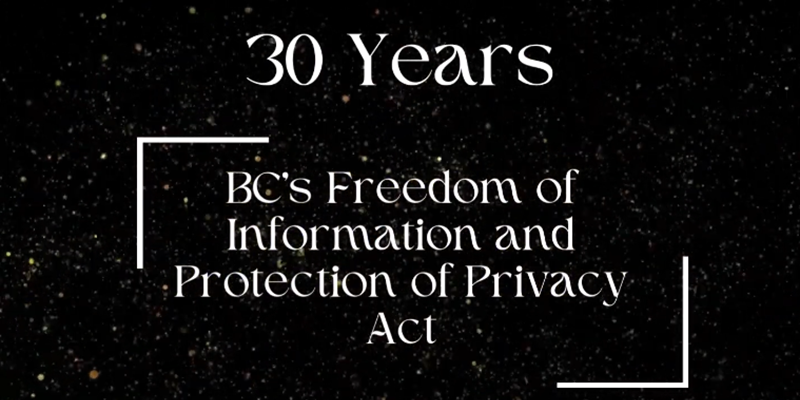
Celebrating 30 years of BC's Freedom of Information and Protection of Privacy Act
On October 4, 1993, BC’s Freedom of Information and Protection of Privacy Act came into force. The legislation receiv...

On October 4, 1993, BC’s Freedom of Information and Protection of Privacy Act came into force. The legislation receiv...

A follow-up report has found the Provincial Health Services Authority (PHSA) has taken meaningful steps to incorporat...

Commissioner McEvoy presents the 2022-23 OIPC Annual Report. Read on to watch a welcome video from the Commissioner o...

On March 9, 2023, the Office of the Information and Privacy Commissioner for British Columbia (OIPC) hosted the OIPC ...

The investigation looked at a number of issues, including: whether consent to FRT was properly obtained from individu...

A preliminary review of the impact of BC’s application fee for freedom of information requests reveals limited paymen...

The Provincial Health Services Authority (PHSA) has failed to address security and privacy vulnerabilities in BC’s Pr...

Commissioner McEvoy presents the 2021-22 OIPC Annual Report. Read on to watch a welcome video from the Commissioner o...

Information and Privacy Commissioner Michael McEvoy announced the launch of the OIPC Young Scholars Project today, on...



The OIPC continues to provide service to the public, public bodies, and private sector. To protect the health of our ...










Getting #PrivacyRight means respecting the trust that individuals place in organizations that collect, use or disclos...

This month, learn about the authority to collect, use, and disclose personal information. Explore our latest online t...

This month, learn about accountability and the benefits of implementing a privacy management program. We have several...

The secret’s out… privacy is good business. And to help you and your organization get on board, we are launching Priv...

You probably noticed a flurry of emails in your inbox over the past few weeks, as everything from social media apps t...

I am as surprised as anyone that email retention and deletion by government staff is again making news. These matters...

This year, as the Asia Pacific Privacy Authorities (APPA) mark Privacy Awareness Week, there couldn’t be a more impor...

How many times a day are you asked for your email, telephone number, postal code, or birth date? Probably more than y...

Let’s face it – protecting data in our digital society isn’t easy. Devices intended to improve our lives also collect...

Last week we released a tip sheet for public bodies managing requests for records, in conjunction with our audit repo...

Are you tempted by the potential benefits of cloud-computing? The option can be appealing, as the service often cuts ...

I recently spoke about the Internet of Things and Big Data at a healthcare summit in Vancouver. Well, let’s be honest...

Updated guidance is now available to physicians on privacy and security of patient records

A few weeks ago, my office and the Office of the Privacy Commissioner of Canada (OPC-Canada) co-hosted the 48th Asia ...

From September 25 to October 2 we are celebrating Right to Know week to raise awareness of our right to access govern...

The use of dash-cams by private sector organizations is, from any practical perspective, likely unlawful in BC.
I was invited to speak to this group because Selkirk College has been awarded a three-year federal grant to explore o...

Inizia oggi la celebrazione della Settimana del diritto di sapere, dedicata alla promozione della libertà di informaz...

B.C.’s Personal Information Protection Act (“PIPA”) sets out how the province’s 380,000-plus private-sector “organiza...
This post is the first in a series of essays from students in Political Science 370, The Politics of Surveillance, a ...
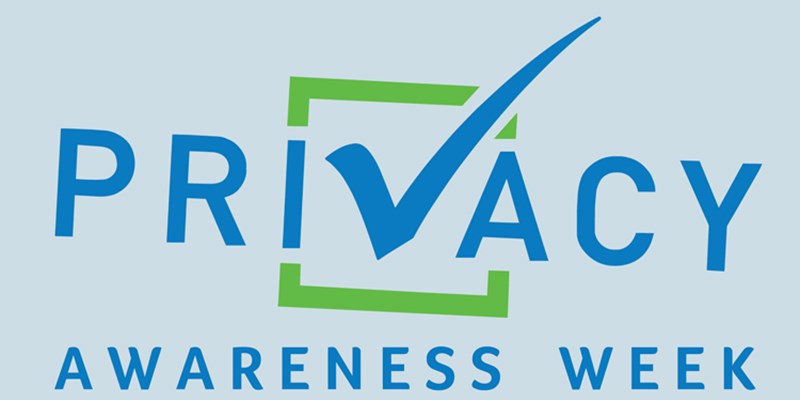
Ogni anno, all'inizio di maggio, i professionisti della privacy di tutto il mondo celebrano la Privacy Awareness Week...

È come avere un personal trainer personale, a un costo minore. Ma i risultati di uno studio condotto dai ricercatori ...

È capitato a tutti: un'e-mail sospetta, una chiamata di disturbo o un'offerta troppo bella per essere vera. Dagli sch...

Nella nostra complessa era digitale, le tensioni tra le forze dell'ordine e le aziende tecnologiche continuano ad acu...

Di Martin Abrams Nel dicembre 2015, il supervisore europeo della protezione dei dati Giovanni Buttarelli ha emesso un...

From dog licences and parking tickets to property taxes and building permits, B.C.’s regional governments and municip...

L'economia digitale non richiede passaporti... né visti speciali. Ma c'è un problema: sistemi legali diversi e norme ...

Il "Bring Your Own Device" o BYOD sta diventando sempre più popolare per molte organizzazioni del settore privato. Ma...
Dalle bambole parlanti alle versioni in miniatura dei telefoni cellulari, dei tablet e degli orologi intelligenti di ...

Tutti ci aspettiamo che gli enti pubblici e le aziende proteggano le loro reti informatiche dalle minacce esterne, ma...
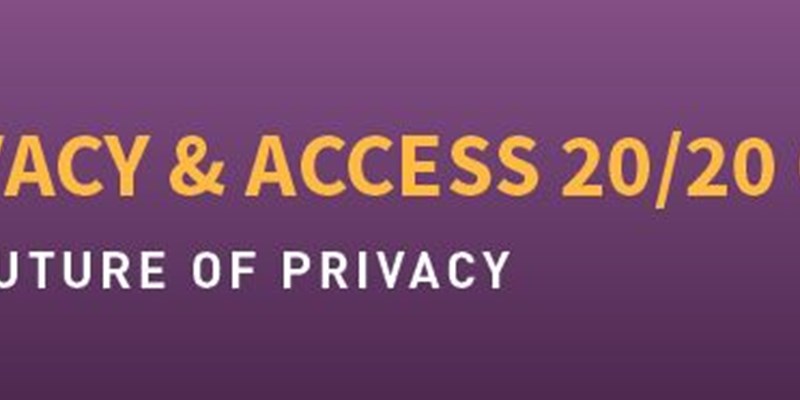
La scorsa settimana il mio ufficio è stato orgoglioso di ospitare a Vancouver un'importante conferenza intitolata Pri...
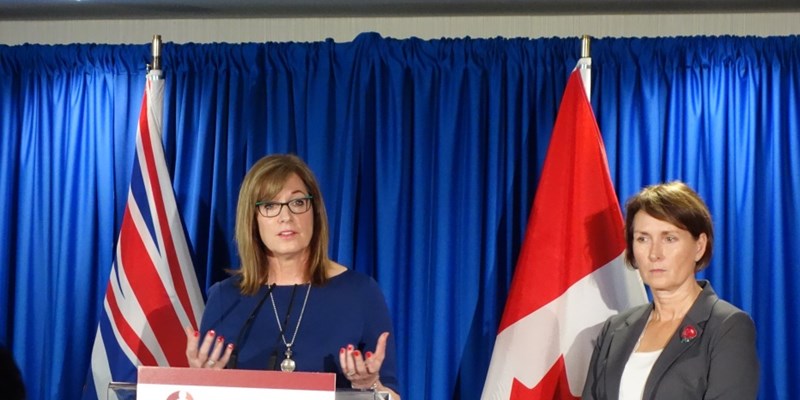
In un piovoso venerdì 13 a Vancouver, il Commissario per l'Informazione e la Privacy Elizabeth Denham e la Rappresent...

Non è sempre possibile portare a termine tutto il lavoro in otto ore. A volte è inevitabile portare il lavoro a casa....

Quando il 1° luglio 2014 è entrata in vigore la legislazione canadese anti-spam (CASL), le nostre caselle di posta el...
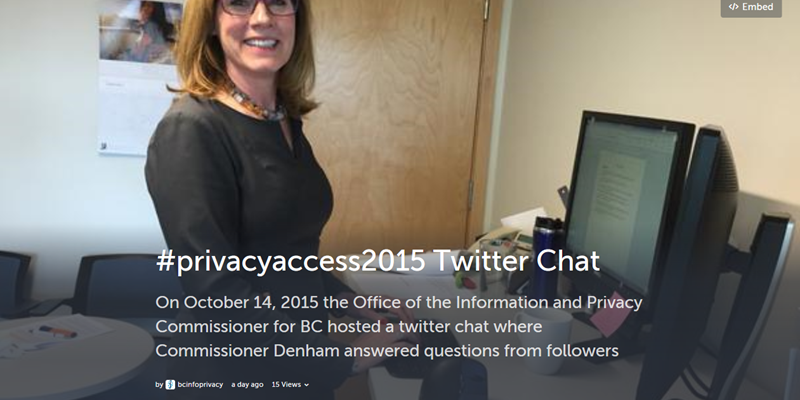
Vi siete persi la chat di ieri su Twitter con il Commissario? Continuate a leggere il testo completo delle domande e ...

On Nov. 12 and 13, the OIPC will host “Privacy and Access 20/20: The Future of Privacy" with our partner, Reboot Comm...

The Information and Privacy Commissioner receives hundreds of complaints and appeals from British Columbians each yea...

Every year I look forward to Right to Know week, because it gives us a chance to celebrate and acknowledge the value ...
Lo scopo della Settimana del diritto di sapere è quello di sensibilizzare l'opinione pubblica sui propri diritti di a...

This month, learn about accountability and the benefits of implementing a privacy management program. We have several...


Orari: Lun-Ven 8:30-16:30
Telefono: (250) 387-5629
E-mail: info@oipc.bc.ca
La nostra politica sulla privacy illustra quali informazioni raccogliamo e perché le raccogliamo.
Disclaimer: se state visualizzando questa pagina in una lingua diversa dall'inglese, è stata tradotta automaticamente. L'OIPC non può confermare l'accuratezza dei contenuti tradotti. In caso di domande sulla traduzione, contattare info@oipc.bc.ca.
